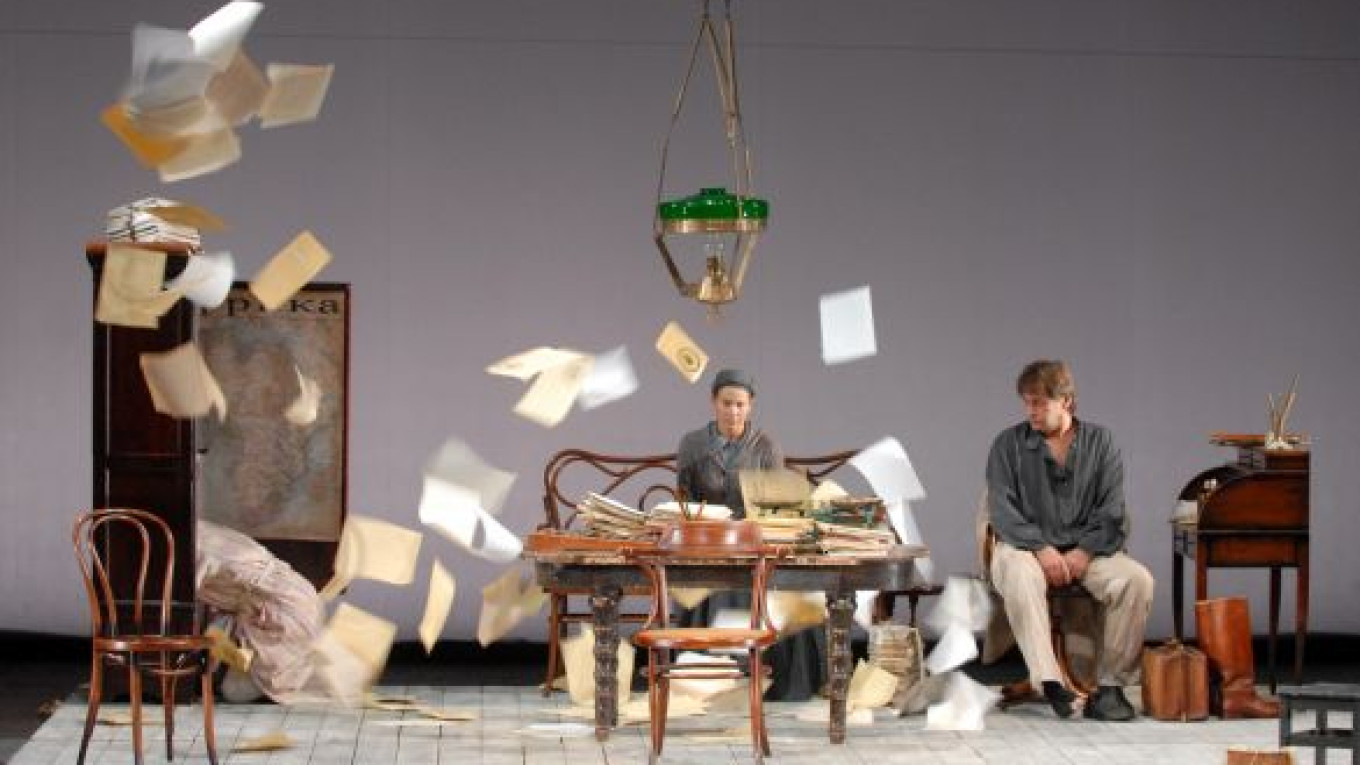In Anton Chekhov’s “Uncle Vanya” at the Mossoviet Theater, Andrei Konchalovsky finds room for both of the art forms that continue to give him no peace — film and theater.
In his stage work, the cinematic sensibility is one of the things that make Konchalovsky stand out. His productions are fine-tuned to a seamless degree that one rarely finds in theater, essentially a wonderfully crude and inexact art. Yet he also revels in the theater’s clunkiness, its sense of being cobbled together with hammers and nails and sweat and thick makeup.
His “Uncle Vanya” starts with overt references to both theater and film. On a huge screen we watch a film of a contemporary street scene shot on Triumfalnaya Ploshchad, just a stone’s throw from the theater. At the same time, a busy stage manager bustles about on stage, verifying one last time that everything is in place. She returns before Act Two as well, supervising stage hands, getting actors into place and, finally, when all is ready, signaling to the lighting man to dim the house and get the show rolling.
That is not all that Konchalovsky does to bare backstage mechanisms, however.
At either side of the stage set — designed by the director himself — stand rows of chairs. These are for actors who are waiting to come on stage, or who have finished their scene and would like to rest before heading backstage. Their presence has the effect of concentrating attention and energy on the small, raised wooden platform at center stage where all of the action takes place.
Supporting characters such as the hanger-on Telegin (Alexander Bobrovsky) and the nanny (Larisa Kuznetsova) are performed as theatrical caricatures. Uncle Vanya (Pavel Derevyanko) and his hated brother-in-law, the pompous Professor Serebryakov (Alexander Filippenko), also lean on the kind of broad strokes and histrionics that one customarily associates with theater, although with a depth of nuance that leans toward the cinematic.
On the other hand, Vanya’s niece Sonya (Yulia Vysotskaya), Serebryakov’s wife Yelena (Natalia Vdovina) and the family doctor Astrov (Alexander Domogarov) turn in fully-rounded, deeply considered performances that could be transferred to film almost as is.
The result is a strange and affecting stew of styles capable of cranking up the humor even as it appeals to our sense of empathy. If the balance among styles does not always hold up perfectly, that is hardly a major complaint. This is a big, effective and surprising rendition of Chekhov’s timeless play about people’s lives wasting away as they look on helplessly.
Derevyanko’s Vanya, a man who, for decades, has devoted his time and talents to keeping Serebryakov happy by running the family’s country estate, is surely one of the most eccentric interpretations of this character ever attempted. He is small and quick and fragile, has a lively mind and a ready sense of humor. But in his isolation from the world, he has become downright odd, almost a clown. He no longer fits in anywhere.
Sonya retains all her illusions about love and human kindness. She is dreamy and businesslike all at once, perfectly capable of running the estate when Vanya breaks down, but blind to the fact that her hope for a life with Astrov is utterly unfounded.
The production’s most beautiful and heartbreaking scene takes place when the fluttering Sonya loses her head one night as the drunken Astrov clumsily brushes against her while confiding in her or accidentally strokes her arm while draping his coat over her shoulders. Her feverish romantic delusions crash rudely against the stone wall of his complete and total disinterest, although she doesn’t see that at all.
Yelena is not the usual femme fatale, but something far more delicate. She is a sensuous beauty who seems not to know that about herself. She probably still sees herself as a child, and thus has retained a childlike innocence. She never takes Vanya’s advances seriously and, to a point, is horrified by the lust she kindles in Astrov.
Domogarov’s Astrov is the center around which this production turns. He is rude and cultured, a drunk with manners and brains, a bit of a lecher with a conscience. He is a man with an enormous, imposing personality living a life of obscurity and increasing futility.
There is much to recommend Konchalovsky’s unexpected rendering of “Uncle Vanya” — not the least of which are the gorgeous costumes by Rustam Khamdamov. But Domogarov’s rough-cut Astrov is what will stick with me for a very long time.
“Uncle Vanya” (Dyadya Vanya) plays Feb. 26, 27, March 5, 6 and 25 at 7 p.m. at the Mossoviet Theater, located at 16 Bolshaya Sadovaya Ulitsa. Metro Mayakovskaya. Tel. 699-2035, www.mossovet.theatre.ru. Running time: 3 hours.
A Message from The Moscow Times:
Dear readers,
We are facing unprecedented challenges. Russia's Prosecutor General's Office has designated The Moscow Times as an "undesirable" organization, criminalizing our work and putting our staff at risk of prosecution. This follows our earlier unjust labeling as a "foreign agent."
These actions are direct attempts to silence independent journalism in Russia. The authorities claim our work "discredits the decisions of the Russian leadership." We see things differently: we strive to provide accurate, unbiased reporting on Russia.
We, the journalists of The Moscow Times, refuse to be silenced. But to continue our work, we need your help.
Your support, no matter how small, makes a world of difference. If you can, please support us monthly starting from just $2. It's quick to set up, and every contribution makes a significant impact.
By supporting The Moscow Times, you're defending open, independent journalism in the face of repression. Thank you for standing with us.
Remind me later.


